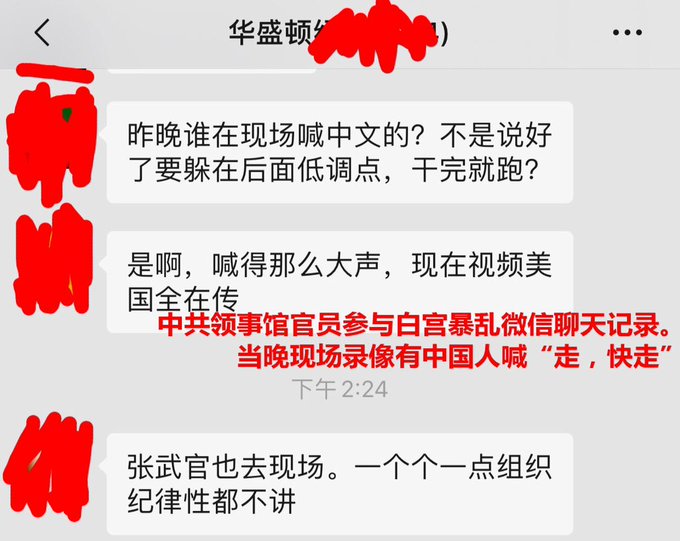A YouTube video indicated that the Chinese Embassy in the U.S. is involved in the U.S. Riots.
The video clip at time 1:05 to 1:18 shows that protesters were throwing stones and the police fired tear gas. The host said that it was in front the White House in the evening on May 31. A Chinese voice shouted out, “Leave quickly! Leave, Leave, Leave, Leave, Leave!” (“快走!走、走、走、走、走!“)
The author of the video tweeted on his Twitter account “@一剑飘尘06” with a link to the video. His tweet said,
“Major Breaking News: The Chinese military attaché is related to the White House riots! The Chinese words ‘leave quickly’ (were recorded) on the spot and (it showed that) the Chinese Consulate had arranged for the thugs presence! Clear evidence! The Chinese Communist Party (CCP) is behind the unrest in the U.S. How could (the CCP) be so unscrupulous? Is this a problem of the (communist) system? Can the U.S. government legally repress (the riots)?”
The author also posted a screenshot of a statement from WeChat that he said a netizen in Washington, DC provided to him. It was about a WeChat conversation among people at the Chinese Embassy. The conversation read as follows:
“Who shouted in Chinese on the site? Didn’t we say that (our people should) stay at the back and remain low key, and just leave after finishing (the work)?”
“Yeah, shouted very loudly. Now the video is spreading all over the U.S.”
“Military Attaché Zhang also went to the site. None of these people followed discipline.”
A comment after the Tweet said, “The Military Attaché at the China’s Embassy indeed has the surname Zhang. Major General Zhang Li once served as an attaché in China’s Embassy in Thailand. He became an attaché (in Washington) in 2018.”
Radio France International also reported the “leave quickly” video. It also reported that a Tweet by account “@魏歌” said that the U.S. police arrested three Chinese students during the riot in Santa Monica, California. The students admitted that the local Chinese consulate directed them to parade along with the African Americans and stir up looting, to “carry forward their patriotism and make new contributions for the CCP and China.”
It also reported that some Chinese students posted Louis Vuitton bags on the Internet. They looted the bags during the riots. One student said, “I love the CCP and I love my motherland. The U.S. owes our China many debts. Just a few bags; they don’t need to be so stingy.”
Sources:
1. YouTube
2. Twitter, Account @一剑飘尘06, June 2, 2020
重大爆料:白宫暴乱有中共武官的影子!现场“走快走”的中国话,是中领馆安排的暴徒!证据确凿!中共是美国骚乱的幕后黑手,怎么会如此肆无忌惮?真的是制度问题?美国政府有没有镇压的合法性? https://t.co/2pbjTQFob4 来自 @YouTube pic.twitter.com/rms7xGJTps
— 一剑飘尘06 (@yjpc06) June 2, 2020
3. Screenshot of the WeChat conversation:

4. Radio France International, June 4, 2020
http://www.rfi.fr/cn/中国/20200604-中国留学生参加西雅图暴徒抢劫-美国非裔骚乱可见中国人身影
